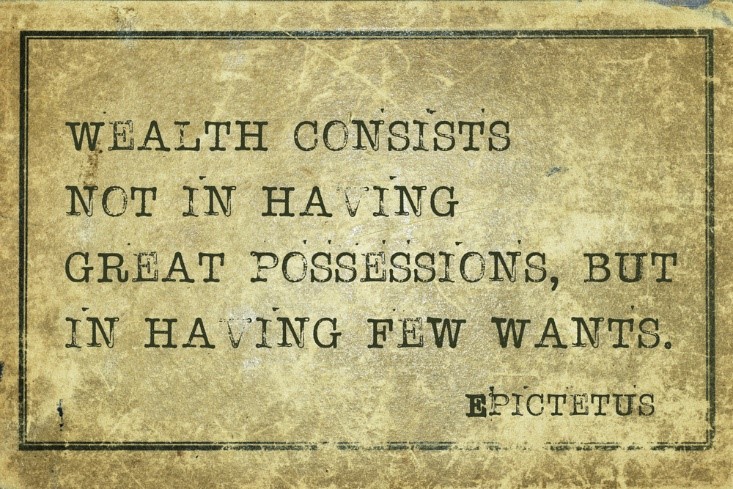Editor’s Note: Since the launch of Liberty Through Wealth on Monday, June 11, it has come to our attention that many of you haven’t received it daily, if at all.
Sometimes when an email comes from a new name or address, even though you’ve subscribed to it, your email service provider may think it’s junk and not let it through its systems – or send it to another folder like “Promotions” or “Spam.”
To ensure you continue to get Chief Investment Strategist Alexander Green’s and ETF Strategist Nicholas Vardy’s insights every day, please take a moment to whitelist Liberty Through Wealth. The instructions are easy to follow and can be found here.
– Donna DiVenuto-Ball, Managing Editor
Wealth consists not in having great possessions, but in having few wants.
– Epictetus
How do you live a happy and fulfilling life?
Silicon Valley believes it has found the answer.
Surprisingly, it has nothing to do with the latest iPhone app or algorithm derived from big data.
Instead, the secret lies with an ancient Greek philosophy that has taken Silicon Valley by storm.
Why (Almost) Everyone in Silicon Valley Feels Like a Failure
Silicon Valley is a surprisingly tough place to be happy. That’s because there is always someone richer or more successful than you are.
A few years ago, I had dinner with a college classmate of mine in Silicon Valley. He was founder and CEO of a profitable internet company worth tens of millions.
That night, he pointed to a nondescript pizza shop across the street. Above the pizza shop was YouTube’s headquarters before Google acquired it in 2006 for $1.65 billion.
He pointed out that he’d have been much richer had he been a mere janitor at YouTube. (In the majority of Silicon Valley startups, most staff get stock options.)
Scratch the surface of Silicon Valley success stories like my friend’s and there are thousands of highly educated and highly capable professionals in Silicon Valley who feel like failures.
Why? Because they’re not billionaires like the guy they sat next to in college.
So these folks have found solace in the ancient Greek philosophy of Stoicism.
What is Stoicism?
I first learned about Stoicism through the writings of Roman emperor Marcus Aurelius’ Meditations.
But Silicon Valley’s favorite stoic today is Aurelius’ teacher Epictetus.
Epictetus’ central teachings are summarized in The Manual (also known as The Enchiridion), modeled on the military manuals of the day. Roman soldiers would even carry Epictetus’ Manual into battle.
Much like John Stuart Mill’s lessons, Epictetus’ teachings seem uncannily contemporary.
In our society, most people regard professional achievement and wealth as desirable and admirable. (This is particularly true for hotbeds of success like Silicon Valley, Hollywood and Wall Street.)
For Epictetus, worldly wealth and power are irrelevant to true happiness. Instead, he argues that personal fulfillment is the result of living your life well.
And a life well-lived is a progression of steps guided by your personal ideals.
This is an inner journey that has little to do with material success (though it certainly does not exclude it.)
Epictetus counsels that you should not live your life to earn the favor or admiration of others.
Instead, your goal should be to achieve inner serenity – the only genuine route to personal freedom and happiness.
The good news?
The journey to personal serenity is not the exclusive province of monks, saints or ascetics. It is available to anyone at any time.
Epictetus’ Prescription for the Good Life
1. Master Your Desires
Our desires are mercurial rulers. They demand to be pleased.
But Epictetus points out that having desires is a habit. And you can always train yourself to learn better habits. And the single best practice is to reign in your desires.
If you desire something that isn’t within your control, you will be disappointed. It is focusing only on what you can control that can make a real difference.
2. Play Your Role Well
We have all been assigned roles in life.
Some of us will act in a short drama, others in a long one.
You might be assigned the part of a poor person, a cripple, a celebrity, a public leader… or just an ordinary private citizen.
We can’t control which roles are assigned to us. And the worst thing you can do is complain about it.
Epictetus tells us that like an actor, you must play your role the best that you can.
Always give an impeccable performance.
3. Pursue Your Path and Ignore the Critics
Follow a path consistent with your values.
You will never find happiness if you seek recognition from other people. After all, even people who love you will not necessarily agree with your ideas or understand you.
And no matter who you are or what you do, someone will stand ready to criticize you.
Don’t be afraid of this abuse or criticism. But always refrain from defending your reputation or intentions. Any effort to do so only debases your character.
So what advice does Epictetus afford the thousands of outwardly successful but still frustrated entrepreneurs in Silicon Valley?
Yes, money matters.
As Mae West famously observed, “I’ve been rich and I’ve been poor, and rich is better.”
And it’s hard to focus on spiritual enlightenment if you can’t pay your bills.
Still, authentic happiness does not depend on external conditions – and which ticket you happen to punch in the Silicon Valley startup lottery.
Win or lose, you will find true happiness only inside yourself – whether you were a Roman Emperor in the 2nd century or a Silicon Valley billionaire the 21st.
Finding and sticking with your purpose is what gives your life coherence and meaning. Stop striving to be anyone other than your own best self.
Strive, instead, for a life of serenity.
Good investing,
Nicholas
